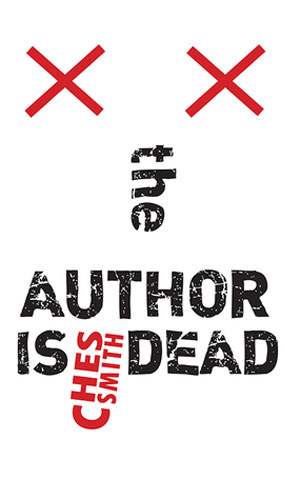‘The Author is Dead’ by Ches Smith
 It’s nothing new for a novel’s key character to share his name with the book’s author. Past examples are Stephen King in Song of Savannah, Paul Auster in New York Trilogy, and Philip Roth in Operation Shylock. But Ches Smith’s protagonist, Ches Smith, is something apart and definitely a standout character in Smith’s new book, The Author is Dead. Try not to speculate on any detail in this book that might be drawn from the author’s life, except that it’s about a writer who writes a book titled The Author is Dead.
It’s nothing new for a novel’s key character to share his name with the book’s author. Past examples are Stephen King in Song of Savannah, Paul Auster in New York Trilogy, and Philip Roth in Operation Shylock. But Ches Smith’s protagonist, Ches Smith, is something apart and definitely a standout character in Smith’s new book, The Author is Dead. Try not to speculate on any detail in this book that might be drawn from the author’s life, except that it’s about a writer who writes a book titled The Author is Dead.
We meet Ches, the character, at Sugarville Mall. He carries his writings, his so called “loose-leaf chronicles,” in a black binder that’s always with him. Ches is intrigued by Thalia, lead singer with the Zombie Cowgirls, a “punk-country fusion” band. One short conversation with her and he’s hooked. It won’t be giving anything away to tell that Thalia very soon becomes his ghostly muse, since her otherworldly presence is key to this story’s setup.
 It’s nothing new for a novel’s key character to share his name with the book’s author. Past examples are Stephen King in Song of Savannah, Paul Auster in New York Trilogy, and Philip Roth in Operation Shylock. But Ches Smith’s protagonist, Ches Smith, is something apart and definitely a standout character in Smith’s new book, The Author is Dead. Try not to speculate on any detail in this book that might be drawn from the author’s life, except that it’s about a writer who writes a book titled The Author is Dead.
It’s nothing new for a novel’s key character to share his name with the book’s author. Past examples are Stephen King in Song of Savannah, Paul Auster in New York Trilogy, and Philip Roth in Operation Shylock. But Ches Smith’s protagonist, Ches Smith, is something apart and definitely a standout character in Smith’s new book, The Author is Dead. Try not to speculate on any detail in this book that might be drawn from the author’s life, except that it’s about a writer who writes a book titled The Author is Dead.
We meet Ches, the character, at Sugarville Mall. He carries his writings, his so called “loose-leaf chronicles,” in a black binder that’s always with him. Ches is intrigued by Thalia, lead singer with the Zombie Cowgirls, a “punk-country fusion” band. One short conversation with her and he’s hooked. It won’t be giving anything away to tell that Thalia very soon becomes his ghostly muse, since her otherworldly presence is key to this story’s setup.
As Smith lays out the book’s plot, Ches is a guy looking for fame and fortune as a writer, but he just can’t catch a break. His day job, a computer tech at a public middle school, brings little satisfaction:
For a computer tech, the simple act of walking down the hall can play out like one of those zombie movies where the protagonist is cornered by one zombie, then two, then a hundred.
“I can’t get on the internet.”
“My computer won’t start.”
He’s also a lonely guy. Thanksgiving arrives and we glimpse our hero’s holiday:
One place setting at the table.
Ravioli spinning on the microwave carousel at five minutes, half power.
[ . . . ] And as for entertaining a house full of extended family, I’d rather get scrotal piercings, one for every day of the year.
While Thalia sets Ches on a quest to find her killer, she poses philosophical tidbits about his writing, asking: “Still looking to change the world? To write the next great American novel? [ . . . ] You’re riddled with self-doubt. That’s a start.” She goes on to say:
The masses see the world as a single, unbroken plane. Everything is black and white. Their perspective unbending. Others, much fewer in number, brilliant minds, see things from many perspectives. View the world in ways unimaginable to others.
At the opposite pole, when Ches seeks further input on the book he’s writing, criticism abounds. Fellow teacher Hemi advises: “I think it’s nice you’re writing, but don’t hang all your hopes on it, ya know.” And later, “I don’t think it’s salvageable. Not as a proper book at least.” Even his ex-wife tells him: “You’re not creative. You only think you are. [ . . . ] You’re not the next big thing.”
Smith introduces more characters that shuttle Thalia into the background. They include Thalia’s sister Calliope, the story’s main culprit John, an anti-muse, and a score of others. We also witness a student uprising against standardized tests that seemed to me like another story altogether, but Smith soon makes it clear that thirteen-year-old student Elvira Moon is important to his plot. One other significant character that, surprisingly, doesn’t have a name is Ches’s gun, which takes on various roles throughout the novel.
All in all, Smith gives The Author is Dead a satisfying conclusion, but still I wanted to read more about Thalia and her apparitional doings. Maybe she’ll appear in one of his later works. It remains to be seen if Ches Smith gains equal recognition with renowned writers who’ve named characters after themselves, but I look forward to finding out.
Review by Valerie Wieland




